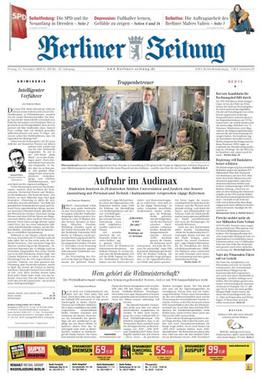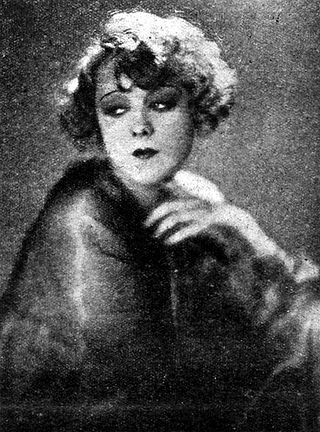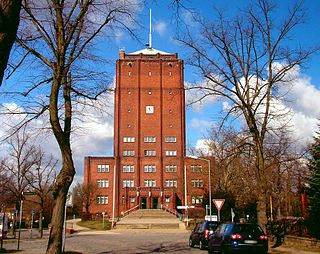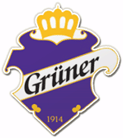
Grüner VeltlinerGerman:[ˈɡʁyːnɐfɛltˈliːnɐ] ) is a white wine grape variety grown primarily in Austria, Hungary, Slovakia, and the Czech Republic. The leaves of the grape vine are five-lobed with bunches that are long but compact, and deep green grapes that ripen in mid-late October in the Northern Hemisphere.

The Berliner Zeitung is a daily newspaper based in Berlin, Germany. Founded in East Germany in 1945, it is the only East German paper to achieve national prominence since reunification. It is published by Berliner Verlag.

Anny Ondra was an Austrian (German) and Czech film actress. She began her career in 1920 and appeared in Czech, German, Austrian, French and English films. In 1933, she married German boxing champion Max Schmeling.

Hollenstedt is a municipality in the district of Harburg, in Lower Saxony, Germany. It is situated approximately 25 km southwest of Hamburg, and 12 km south of Buxtehude.

Neuenhagen bei Berlin is a municipality in the district Märkisch-Oderland of Brandenburg, Germany. It is situated 19 km east of central Berlin, and was founded around 1230.

Kisvárda is a town in Szabolcs-Szatmár-Bereg County, in the Northern Great Plain region of eastern Hungary near the border of Slovakia and Ukraine. It is the 3rd largest town in Szabolcs-Szatmár-Bereg after Nyíregyháza and Mátészalka with a population of 16 669 people. The Subregion of Kisvárda lies between two large landscapes, the Nyírség and the Rétköz. Kisvárda is just 22 km (14 mi) from the border of Ukraine, 30 km (18.6 mi) from Slovakia, 43.9 km (27.3 mi) from Nyíregyháza, 50 km (31 mi) from Ungvár (Uzhorod), 52.1 km (32.4 mi) from Beregszász (Berehove), 52.9 km (32.9 mi) from Sátoraljaújhely and 80 km (50 mi) from Dorolţ, Romania.

Gruner + Jahr GmbH is a publishing house headquartered in Hamburg, Germany. The company was founded in 1965 by Richard Gruner, John Jahr, and Gerd Bucerius. From 1969 to 1973, Bertelsmann acquired a majority share in the company and gradually increased it over time. After 2014, the company was a fully owned subsidiary of the Gütersloh-based media and services group. Under the leadership and innovation strategy of Julia Jäkel, Gruner + Jahr evolved into a publishing house producing cross-channel media products for the digital society.
Hollenstedt is a Samtgemeinde in the district of Harburg, in Lower Saxony, Germany. It was created as part of municipal reorganization in Lower Saxony on 1 July 1972. Its seat is in the village Hollenstedt.
Carl Eduard Gruner was a Basel-born Swiss engineer, manager of the Swissboring Company and later on a partner at the "Gruner Brothers" engineering company. He made considerable contributions to many projects in Europe. the Middle East, Central Asia and South America, most particularly the construction of the Trans-Iranian Railway, in which he participated as a Sector Engineer.

Dælenenga idrettspark is a sports facility located at Grünerløkka in Oslo, Norway. It consists of an artificial turf football pitch, a club house and an indoor ice rink—Grünerhallen. The facilities are owned by the Municipality of Oslo and used and operated by Grüner IL, the local sports club.

Grüner Idrettslag is a Norwegian alliance sports club from Grünerløkka, Oslo. It has sections for association football, team handball and ice hockey, formally named Grüner Fotball IL , Grüner Håndball IL and Grüner Ishockey IL. The club colors are purple.
Sybille Gruner was a member of the German women's national handball team between 1989 and 1995. In 1993 the team won the world championships in a very close game against Denmark. One year later, during the European championship final in Berlin, they played the Danish team again and lost.
The Rheinmetall MG60 is a general-purpose machine gun of West German origin. The weapon is a post-World War II derivative of the MG 45 experimental general-purpose machine gun.
The IHF Men's Handball World Championship has been organized indoor by the International Handball Federation since 1938.

The Holocaust in Bohemia and Moravia resulted in the deportation, dispossession, and murder of most of the pre-World War II population of Jews in the Czech lands that were annexed by Nazi Germany between 1939 and 1945. By 1946, only about 14,000 of the pre-war population of 118,000 remained.

The Holocaust in Bohemia and Moravia: Czech Initiatives, German Policies, Jewish Responses is a book by the German historian Wolf Gruner on the Holocaust in Bohemia and Moravia, the Czech-majority parts of Czechoslovakia partially annexed into Nazi Germany during the German occupation of Czechoslovakia. Beginning before the Munich Agreement, Gruner's book covers the various stages of persecution of Jews which led to their deportation and murder. He argues that the role of Czech collaboration and local initiatives was greater than has been conventionally assumed, and also that Jewish resistance to persecution was substantial. The book has received mixed reviews; some Czech historians have disagreed with Gruner's conclusions while other reviewers generally praised the book with some reservations. The book was published in German in 2016 and in English and Czech in 2019. It received the 2017 Sybil Halpern Milton Memorial Book Prize of the German Studies Association.
The following squads and players competed in the women's handball tournament at the 1992 Summer Olympics.
Für Dich was a weekly women's magazine published in East Germany and then in Germany following the unification. It was the only publication in East Germany which specifically targeted women. Official description of the magazine in 1988 was "illustrated weekly magazine for women, with contemporary political, economic and cultural contributions." It was in circulation between 1946 and 1991.










